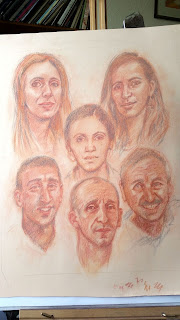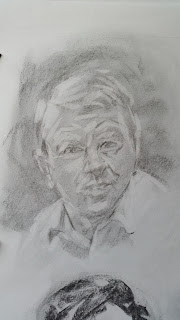Friday, 20 September 2019
Wednesday, 15 May 2019
Progress of a big group caricature
I thought it would be of interest to show the stages of the method I used for doing a very complicated
multiple caricature for an army regiment I did recently. ( watercolour 24x20 inches)
multiple caricature for an army regiment I did recently. ( watercolour 24x20 inches)
Tuesday, 20 November 2018
Teach Yourself to Draw 5
SIMPLIFY!
To tackle any drawing the 1st move is to simplify the scene you are faced with.
Look past the surface and see the basic form. The details can wait till the drawing is just about done, then the details effortlessly fall into place like the icing on the cake.
This is why, practising the basic forms - Cube, sphere, cylinder, cone and gesture drawing helps to acheive
this ability to see beyond the superficial.
It is THE beginners mistake, focusing on the details and not seeing the true forms.
Turn your drawings from 2D to 3D. Get that 3rd Dimension,that is what makes drawings stand out and
gives them life.These preliminary sketches by an Italian master Luca Cambiaso were his way of working out the forms that were to make up complicated paintings.
gs.
To tackle any drawing the 1st move is to simplify the scene you are faced with.
Look past the surface and see the basic form. The details can wait till the drawing is just about done, then the details effortlessly fall into place like the icing on the cake.
This is why, practising the basic forms - Cube, sphere, cylinder, cone and gesture drawing helps to acheive
this ability to see beyond the superficial.
It is THE beginners mistake, focusing on the details and not seeing the true forms.
Turn your drawings from 2D to 3D. Get that 3rd Dimension,that is what makes drawings stand out and
gives them life.These preliminary sketches by an Italian master Luca Cambiaso were his way of working out the forms that were to make up complicated paintings.
gs.
Monday, 12 November 2018
Teach Yourself to Draw 4
Gesture Drawing has been a very important technique for me.I like to see spontaneity and life in the work I admire. Gesture drawing has helped me to develop a fearless approach to drawing. Looking for the essential gesture of the subject, be it animal, vegetable or mineral. Going for the essence as fast as possible is exhilirating. Sitting in airports waiting for a flight is a perfect place to draw people on the move, even those sitting reading change position very quickly. So the rapid continuous line is the only way to grab that movement, that pose. All those quick sketches build up a great memory bank of images.Here are some from one of my sketch books that I always have with me wherever I go.
The very rapid sketches by Rodin of Cambodian dancers are typical gesture drawings.
The very rapid sketches by Rodin of Cambodian dancers are typical gesture drawings.
Monday, 5 November 2018
Teach Yourself to Draw 3
These are the key techniques that have been the biggest help in enabling me to learn to draw -
Simple Forms -Cubes, Spheres, Cylinders, Cones.
Briefly - Practising these forms till you begin to see them everywhere, you begin to simplify and see these forms, usually a combination of, in every object, in a face, in a forest, in a street.
Gesture Drawing
- Or fast sketching. Drawing the `gesture` of an object, a person, whatever is in front at any time.
Always carry a sketchbook and quickly sketch the scene in seconds, waiting for a plane, train, etc.. great fun. No fussing, get it down, take a snapshot with the eye and don`t worry what the drawing will look like.
Negative & Postive Spaces
- Seeing & Drawing the spaces in between things.`Negative` spaces are as important as the `Positive ` forms. You must get both right to draw convincingly.
Artistic Anatomy
- Learning the human form, with endless practise, becoming familiar with the most complicated entity in the universe! The great masters studied the human form rigorously, with a sound
3D knowledgeof the human form everything else becomes easier.
Buy - `Drawing on the Right-Side of the Brain` by Betty Edwards.THE best drawing techniques book of all time.
See - `Proko` on YouTube. Definitely the best drawing techniques on youtube - and great fun!
Awesome, brilliant work from 2 of my favourite American illustrators - Bernie Fuchs & Noel Sickles - look at those negative/positive spaces! All hand drawn & painted in the 50,s, 60`s.
Simple Forms -Cubes, Spheres, Cylinders, Cones.
Briefly - Practising these forms till you begin to see them everywhere, you begin to simplify and see these forms, usually a combination of, in every object, in a face, in a forest, in a street.
Gesture Drawing
- Or fast sketching. Drawing the `gesture` of an object, a person, whatever is in front at any time.
Always carry a sketchbook and quickly sketch the scene in seconds, waiting for a plane, train, etc.. great fun. No fussing, get it down, take a snapshot with the eye and don`t worry what the drawing will look like.
Negative & Postive Spaces
- Seeing & Drawing the spaces in between things.`Negative` spaces are as important as the `Positive ` forms. You must get both right to draw convincingly.
Artistic Anatomy
- Learning the human form, with endless practise, becoming familiar with the most complicated entity in the universe! The great masters studied the human form rigorously, with a sound
3D knowledgeof the human form everything else becomes easier.
Buy - `Drawing on the Right-Side of the Brain` by Betty Edwards.THE best drawing techniques book of all time.
See - `Proko` on YouTube. Definitely the best drawing techniques on youtube - and great fun!
Awesome, brilliant work from 2 of my favourite American illustrators - Bernie Fuchs & Noel Sickles - look at those negative/positive spaces! All hand drawn & painted in the 50,s, 60`s.
Subscribe to:
Comments (Atom)

















































